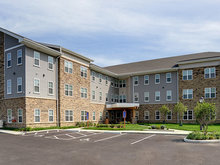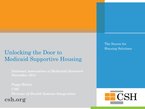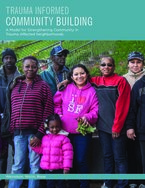0
Webinar
Community:
Nov 14, 2023
This webinar includes a discussion about innovations in trauma-informed approaches to housing from expert speakers. We heard from Julianna Stuart-Lomax presenting about the POAH Trauma-Informed Housing Toolkit and their work in this area. Chad Holtzinger, president of Shopworks Architecture and partner of the Denver Housing Authority, discussed PHA trauma-informed practices at their Thrive project.
Authored by: Housing Is Working Group
Topics: Healthy homes, Housing Is Working Group, Mental health
 Shared by Camille Anoll-Hunter
Shared by Camille Anoll-Hunter
Camille Anoll-Hunter posted a
on Nov 15, 2023
This webinar includes a discussion about innovations in trauma-informed approaches to housing from expert speakers. We heard from Julianna Stuart-Lomax presenting about the POAH Trauma-Informed Housing Toolkit and their work in this area.
0
Webinar
Community:
Sep 12, 2023
This webinar will describe new research that shows children whose families participated in a program that helped them move from distressed neighborhoods to areas with lower rates of poverty experienced significant improvements in severe asthma episodes. Before moving, for every 100 children, there were approximately 88 severe asthma attacks per year. After moving, there were approximately 40 severe attacks per year, a reduction of more than 50%. The webinar will explore factors that help explain these changes in asthma, including the critical role of neighborhood-related stress, and describes future direction and pilot programs.
The publication can be found in the Journal of the American Medical Association here: https://jamanetwork.com/journals/jama/article-abstract/2804823
Authored by: Housing Is Working Group, Johns Hopkins University researchers
Topics: Asthma, Healthy homes, Housing, Mental health, Mobility
 Shared by Camille Anoll-Hunter
Shared by Camille Anoll-Hunter
Camille Anoll-Hunter posted a
on Sep 13, 2023
Housing Is Working Group, Johns Hopkins University researchers
This webinar will describe new research that shows children whose families participated in a program that helped them move from distressed neighborhoods to areas with lower rates of poverty experienced significant improvements in severe asthma episodes.
0
Interactive
Community:
Jan 24, 2023
Join us for an interactive course that explores practical, strength-based ways providers and other caring community members can help support children and families affected by conflict, crisis, or other traumatic experiences. This course can be taken as the first steps of support for newcomer families in your community.
Authored by: Sesame Street Communities
Topics: Early childhood, Family engagement, Healthy homes, Immigrants, Mental health, Youth
 Shared by Sandra Ware
Shared by Sandra Ware
Sandra Ware posted a
on Jan 24, 2023
Sesame Street Communities
Join us for an interactive course that explores practical, strength-based ways providers and other caring community members can help support children and families affected by conflict, crisis, or other traumatic experiences.
0
Webinar
Community:
Dec 14, 2021
At its December 2021 meeting, CLPHA's Housing Is Working Group learned from experts in the field about how they have worked to create resident-focused and community-centered work with their PHAs and partners. We also brainstormed how best to support residents and work towards more equitable and representative housing for everyone, and left with the knowledge of how to better highlight and prioritize resident voices and leadership at every level of our work.
Authored by: Housing Is
Topics: Family engagement, Health, Healthy homes, Housing, Housing Is Working Group, Mental health, Racial inequalities, Supportive housing
 Shared by Stephanie Gray
Shared by Stephanie Gray
Stephanie Gray posted a
on Apr 18, 2022
At its December 2021 meeting, CLPHA's Housing Is Working Group learned from experts in the field about how they have worked to create resident-focused and community-centered work with their PHAs and partners.
0
Publication
Community:
Opened in summer 2018 on the north side of Columbus, Ohio, Laurel Green Apartments is an affordable permanent supportive housing development for residents with mental health conditions.
Authored by: PD&R Edge Online Magazine
Topics: Homelessness, Housing, Low-income, Mental health, Supportive housing
 Shared by Housing Is
Shared by Housing Is
Housing Is posted a
on Jun 11, 2019
PD&R Edge Online Magazine
Opened in summer 2018 on the north side of Columbus, Ohio, Laurel Green Apartments is an affordable permanent supportive housing development for residents with mental health conditions.
0
Publication
Community:
Apr 12, 2019
In Richmond, Virginia, an interprofessional group of health care students and faculty members is helping seniors solve problems early.
Authored by: T.R. Goldman for Health Affairs
Topics: Dental, Health, Low-income, Mental health, Partnerships, Seniors
 Shared by Housing Is
Shared by Housing Is
Housing Is posted a
on Apr 12, 2019
T.R. Goldman for Health Affairs
In Richmond, Virginia, an interprofessional group of health care students and faculty members is helping seniors solve problems early.
0
Interactive
Community:
The Legal Bibliography is collection of 100+ papers, toolkits and other materials focused on privacy, consent and policy documentation. Co-developed by the Network for Public Health Law and Data Across Sectors for Health (DASH), the Bibliography is a growing resource for lawyers and community data practitioners, intended to support local collaboratives in their efforts to share data across sectors.
Authored by: Data Across Sectors for Health (DASH) and Network for Public Health Law (NPHL)
Topics: Criminal justice, Data sharing, Education, Health, Homelessness, Housing, Mental health, Partnerships, Safety
 Shared by Housing Is
Shared by Housing Is
Housing Is posted a
on Apr 8, 2019
Data Across Sectors for Health (DASH) and Network for Public Health Law (NPHL)
The Legal Bibliography is collection of 100+ papers, toolkits and other materials focused on privacy, consent and policy documentation.
0
Publication
Community:
Managing director of Ascend at the Aspen Institute discusses the role of women in public health policy-making
Authored by: Ascend: The Aspen Institute
Topics: Dual-generation, Early childhood, Family engagement, Mental health, Pre-natal, Research
 Shared by Mica O'Brien
Shared by Mica O'Brien
Mica O'Brien posted a
on Apr 2, 2019
Ascend: The Aspen Institute
Managing director of Ascend at the Aspen Institute discusses the role of women in public health policy-making
0
Webinar
Community:
Feb 28, 2019
Join us for an examination of how cross-sector data sharing initiatives are being used to tackle tough public health problems. The webinar will provide an in-depth look at a cross-sector collaboration in Illinois between public health, law enforcement, emergency medical services, a fire department and a jail aimed at addressing the needs of high utilizers of behavioral health services.
Authored by: The Network for Public Health Law
Topics: Criminal justice, Data sharing, Health, Mental health, Midwest, Partnerships, Safety, Stability
 Shared by Housing Is
Shared by Housing Is
Housing Is posted a
on Mar 6, 2019
The Network for Public Health Law
Join us for an examination of how cross-sector data sharing initiatives are being used to tackle tough public health problems.
0
Publication
Community:
Jan 17, 2019
The North Coast Health Improvement and Information Network (NCHIIN) was funded by DASH CIC-START to add new partners, sectors, mental health client summary data, and facility alerts to ACT.md, the care coordination and alerts notification system in Humboldt County, CA. As part of their CIC-START project, NCHIIN developed this document, which provides a methodology for onboarding new organizations, data streams, and sectors into the ACT.md platform.
Authored by: Data Across Sectors for Health (DASH)
Topics: Criminal justice, Data sharing, Health, Mental health, Partnerships, Substance abuse
 Shared by Mica O'Brien
Shared by Mica O'Brien
Mica O'Brien posted a
on Feb 20, 2019
Data Across Sectors for Health (DASH)
The North Coast Health Improvement and Information Network (NCHIIN) was funded by DASH CIC-START to add new partners, sectors, mental health client summary data, and facility alerts to ACT.md, the care coordination and alerts notification system in Humboldt County, CA.
0
Webinar
Community:
Watch this recording of our live session where Senior Content Manager, Kama Einhorn, talks about resources from Sesame Street's Traumatic Experiences topic page.
Authored by: Sesame Street
Topics: Child welfare, Low-income, Mental health, Partnerships
 Shared by Mica O'Brien
Shared by Mica O'Brien
Mica O'Brien posted a
on Dec 12, 2018
Watch this recording of our live session where Senior Content Manager, Kama Einhorn, talks about resources from Sesame Street's Traumatic Experiences topic page.
0
Publication
Community:
Nov 20, 2018
People with mental health disabilities are vastly overrepresented in the population of people who experience homelessness. Of the more than 550,000 people in America who experienced homelessness on a given night in 2017, 1 in 5 had a mental illness. The proportion of people experiencing chronic homelessness with mental health disabilities was even higher—nearly 1 in 3. Despite this fact, the reality is that most people with mental illness fortunately do not experience homelessness: While about 20 percent of all adults in the United States have a mental illness, less than two-tenths of 1 percent of people in the country experienced homelessness on a given night in 2017.
Authored by: Heidi Schultheis for Center for American Progress
Topics: Depression, Disabilities, Homelessness, Housing, Legislation & Policy, Low-income, Mental health, Partnerships, Preventative care, Stability, Substance abuse, Supportive housing
 Shared by Mica O'Brien
Shared by Mica O'Brien
Mica O'Brien posted a
on Nov 20, 2018
Heidi Schultheis for Center for American Progress
People with mental health disabilities are vastly overrepresented in the population of people who experience homelessness. Of the more than 550,000 people in America who experienced homelessness on a given night in 2017, 1 in 5 had a mental illness.
0
Webinar
Community:
Aug 29, 2018
Half of public housing authorities (PHAs) are engaged in at least one health initiative, almost all in partnership with the health sector, according to a new report by the Council of Large Public Housing Authorities (CLPHA) and the Public and Affordable Housing Research Corporation (PAHRC).Health Starts at Home: A National Snapshot of Public Housing Authorities' Health Partnerships finds that PHAs are key players in addressing the intersection of housing and health and that deepening partnerships between PHAs and health providers can better serve residents' and communities’ health needs.
Stephen Lucas (CLPHA), Keely Stater (PAHRC), and Kelly McElwain (PAHRC) discuss health initiatives taking place at PHAs across the country and strategies for better serving communities with cross-sector partnerships.
Authored by: CLPHA
Topics: CLPHA, Dual-eligibles, Health, Housing, Low-income, Medicaid / Medicare, Mental health, Nutrition, Partnerships, Place-based, Preventative care, Research, Seniors
 Shared by Housing Is
Shared by Housing Is
Housing Is posted a
on Oct 11, 2018
Half of public housing authorities (PHAs) are engaged in at least one health initiative, almost all in partnership with the health sector, according to a new report by the Council of Large Public Housing Authorities (CLPHA) and the Public and Affordable Housing Research Corporation (PAHRC).Health St
0
Webinar
Community:
Sep 26, 2018
The Colorado Coalition for the Homeless (CCH) has been investing in supportive housing since 1990. Since that time, this comprehensive community health center has developed nearly 1,700 units of housing, and is one of the country’s leaders in integrating health care and housing for a vulnerable population.
This webinar discusses how CCH finances its capital development; how they plan, design, and manage multiple projects simultaneously; how they integrate housing and health care services; and how they include property management staff in a coordinated approach to care. This conversation with members of CCH’s leadership complements our recent policy brief and included time for audience Q&A.
Authored by: National Health Care for the Homeless Council
Topics: Health, Homelessness, Low-income, Medicaid / Medicare, Mental health, Pacific Northwest, Place-based, Supportive housing
 Shared by Mica O'Brien
Shared by Mica O'Brien
Mica O'Brien posted a
on Oct 9, 2018
National Health Care for the Homeless Council
The Colorado Coalition for the Homeless (CCH) has been investing in supportive housing since 1990.
0
Publication
Community:
Aug 9, 2018
Introduction to supportive housing and notes from the field
Authored by:
Topics: Health, Housing, Low-income, Medicaid / Medicare, Mental health, Partnerships, Supportive housing
 Shared by Housing Is
Shared by Housing Is
Housing Is posted a
on Aug 9, 2018
Introduction to supportive housing and notes from the field
0
Publication
Community:
Aug 9, 2018
Trauma is a set of normal human responses to stressful and threatening experiences (National Center for PTSD, 2007). Low-income and public housing residents may experience cumulative trauma resulting from daily stressors of violence and concentrated poverty, as well as historic and structural conditions of racism and disenfranchisement. We present a model of Trauma Informed Community Building (TICB) that addresses the challenges trauma poses to traditional community building strategies. TICB strategies de-escalate chaos and stress, build social cohesion and foster community resiliency over time.
Authored by:
Topics: Community development, Housing, Low-income, Mental health, Racial inequalities
 Shared by Housing Is
Shared by Housing Is
Housing Is posted a
on Aug 9, 2018
Trauma is a set of normal human responses to stressful and threatening experiences (National Center for PTSD, 2007).
0
Interactive
Community:
Aug 9, 2018
Mental health assessment
Authored by:
Topics: Health, Mental health
 Shared by Housing Is
Shared by Housing Is
Housing Is posted a
on Aug 9, 2018
0
Interactive
Community:
Aug 9, 2018
Mental health assessment
Authored by:
Topics: Health, Mental health
 Shared by Housing Is
Shared by Housing Is
Housing Is posted a
on Aug 9, 2018
0
Publication
Community:
Jul 27, 2018
Anthem’s affiliated health plans and other managed care organizations (MCOs) increasingly are helping Medicaid members who are diagnosed with mental health conditions and substance use disorders (MH/SUD) find stable housing, secure meaningful employment, and address a range of financial and daily life challenges.
Authored by:
Topics: Affordable Care Act, Cost effectiveness, Depression, Funding, Health, Housing, Medicaid / Medicare, Mental health, Nutrition, Substance abuse, Supportive housing, Workforce development
 Shared by Housing Is
Shared by Housing Is
Housing Is posted a
on Jul 27, 2018
Anthem’s affiliated health plans and other managed care organizations (MCOs) increasingly are helping Medicaid members who are diagnosed with mental health conditions and substance use disorders (MH/SUD) find stable housing, secure meaningful employment, and address a range of financial and daily li
0
Publication
Community:
Jul 27, 2018
On January 1, 2014, in states that have chosen to expand Medicaid eligibility under the Affordable Care Act, nearly all chronically homeless people who lacked health insurance became eligible for Medicaid. This Primer offers state Medicaid officials and other interested parties strategies for using Medicaid to meet the needs of this very vulnerable population--some strategies that have succeeded in the past and some that are emerging under provisions of the Affordable Care Act.
Authored by:
Topics: Affordable Care Act, Criminal justice, Disabilities, Dual-eligibles, Funding, Health, Homelessness, Housing, Low-income, Medicaid / Medicare, Mental health, Partnerships, Stability, Substance abuse, Supportive housing
 Shared by Housing Is
Shared by Housing Is
Housing Is posted a
on Jul 27, 2018
On January 1, 2014, in states that have chosen to expand Medicaid eligibility under the Affordable Care Act, nearly all chronically homeless people who lacked health insurance became eligible for Medicaid.
0
Publication
Community:
Jan 1, 2018
SAHF members believe that connecting residents of affordable housing with needed supports – such as educational resources or health services – can help vulnerable families and seniors achieve
a better quality of life. SAHF began the Outcomes Initiative to create a common framework for its members to demonstrate with data the impact on residents of providing housing-based services and support in the five key areas listed below.
Authored by: Stewards of Affordable Housing for the Future (SAHF)
Topics: Asset building, Cost effectiveness, Dual-generation, Education, Exercise, Food insecurity, Health, Housing, Mental health, Metrics, Nutrition, Safety, Stability
 Shared by Housing Is
Shared by Housing Is
Housing Is posted a
on Jul 26, 2018
Stewards of Affordable Housing for the Future (SAHF)
SAHF members believe that connecting residents of affordable housing with needed supports – such as educational resources or health services – can help vulnerable families and seniors achieve
a better quality of life.
0
Publication
Community:
Jul 23, 2018
Part of New York State’s Homelessness Action Plan includes an investment of new supportive housing resources and services over the next five years to address vulnerable populations experiencing homelessness. Therefore, the availability of and access to various support services such as employment and training opportunities, parenting, counseling, independent living skills training, primary healthcare, substance disorder treatment and mental health care, child care, and benefits advocacy are critical components of any project funded under this plan.
Authored by:
Topics: Cost effectiveness, Criminal justice, Disabilities, Domestic violence, Foster care, Funding, Homelessness, Housing, Medicaid / Medicare, Mental health, Substance abuse, Supportive housing, Youth
 Shared by Housing Is
Shared by Housing Is
Housing Is posted a
on Jul 23, 2018
Part of New York State’s Homelessness Action Plan includes an investment of new supportive housing resources and services over the next five years to address vulnerable populations experiencing homelessness.
0
Interactive
Community:
Jul 20, 2018
Kaiser Permanente NW Community Benefit intends to award at least $1.5 million in community grants to support organizations that help people with behavioral health challenges to secure and maintain safe, stable housing. A minimum of five grants of up to $325,000 will be awarded for projects lasting 3 ½ years. Projects must include the involvement of peers or community health workers (CHWs) and must involve collaboration between housing providers, health care providers (including behavioral health service providers) and those community organizations employing peers or CHWs.
Authored by:
Topics: Funding, Health, Homelessness, Housing, Mental health, Pacific Northwest, Partnerships, Place-based, Preventative care, Substance abuse
 Shared by Housing Is
Shared by Housing Is
Housing Is posted a
on Jul 20, 2018
Kaiser Permanente NW Community Benefit intends to award at least $1.5 million in community grants to support organizations that help people with behavioral health challenges to secure and maintain safe, stable housing.
0
Publication
Community:
Jul 13, 2018
Recognizing the layers to developing a health and housing partnership, this Literature Review and Resource Bank is intended to provide background and data resources that can be used in grant applications or in conversations with potential funders in the effort to foster new health and supportive housing partnerships.
Authored by:
Topics: Cost effectiveness, Criminal justice, Data sharing, Dual-eligibles, Funding, Health, Homelessness, Housing, Low-income, Medicaid / Medicare, Mental health, Partnerships, Post-secondary, Preventative care, Research, Seniors, Substance abuse, Supportive housing, Youth
 Shared by Housing Is
Shared by Housing Is
Housing Is posted a
on Jul 13, 2018
Recognizing the layers to developing a health and housing partnership, this Literature Review and Resource Bank is intended to provide background and data resources that can be used in grant applications or in conversations with potential funders in the effort to foster new health and supportive hou
0
Publication
Community:
Jul 12, 2018
This brief aims to bring attention to non-Medicaid funding sources that states could potentially blend or braid to address social determinants of health and other needs that are not typically covered by Medicaid. It is intended to familiarize state Medicaid, public health, and other state policymakers with the funding streams of other agencies, and sketch out a continuum of options to help states coordinate funding to better serve the needs of low-income populations. Because this brief focuses on services for adult Medicaid beneficiaries, it does not address many of the funding sources available for children’s services. However, existing efforts to pool funds for children and youth—notably by the Commonwealth of Virginia—could prove instructive for states seeking to launch such an effort for adults.
Authored by:
Topics: Cost effectiveness, Data sharing, Dual-eligibles, Food insecurity, Funding, Health, Homelessness, Housing, Legislation & Policy, Low-income, Medicaid / Medicare, Mental health, Partnerships, Research, Substance abuse
 Shared by Housing Is
Shared by Housing Is
Housing Is posted a
on Jul 12, 2018
This brief aims to bring attention to non-Medicaid funding sources that states could potentially blend or braid to address social determinants of health and other needs that are not typically covered by Medicaid.
 Shared by Camille Anoll-Hunter
on Nov 15, 2023
Shared by Camille Anoll-Hunter
on Nov 15, 2023
 Shared by Camille Anoll-Hunter
on Sep 13, 2023
Shared by Camille Anoll-Hunter
on Sep 13, 2023

 Shared by Sandra Ware
on Jan 24, 2023
Shared by Sandra Ware
on Jan 24, 2023

 Shared by Stephanie Gray
on Apr 18, 2022
Shared by Stephanie Gray
on Apr 18, 2022

 Shared by Housing Is
on Jun 11, 2019
Shared by Housing Is
on Jun 11, 2019

 Shared by Housing Is
on Apr 12, 2019
Shared by Housing Is
on Apr 12, 2019
 Shared by Housing Is
on Apr 8, 2019
Shared by Housing Is
on Apr 8, 2019



 Shared by Housing Is
on Mar 6, 2019
Shared by Housing Is
on Mar 6, 2019



 Shared by Housing Is
on Oct 11, 2018
Shared by Housing Is
on Oct 11, 2018
 Shared by Housing Is
on Aug 9, 2018
Shared by Housing Is
on Aug 9, 2018
 Shared by Housing Is
on Aug 9, 2018
Shared by Housing Is
on Aug 9, 2018
 Shared by Housing Is
on Aug 9, 2018
Shared by Housing Is
on Aug 9, 2018
 Shared by Housing Is
on Aug 9, 2018
Shared by Housing Is
on Aug 9, 2018
 Shared by Housing Is
on Jul 27, 2018
Shared by Housing Is
on Jul 27, 2018
 Shared by Housing Is
on Jul 27, 2018
Shared by Housing Is
on Jul 27, 2018
 Shared by Housing Is
on Jul 26, 2018
Shared by Housing Is
on Jul 26, 2018
 Shared by Housing Is
on Jul 23, 2018
Shared by Housing Is
on Jul 23, 2018
 Shared by Housing Is
on Jul 20, 2018
Shared by Housing Is
on Jul 20, 2018
 Shared by Housing Is
on Jul 13, 2018
Shared by Housing Is
on Jul 13, 2018
 Shared by Housing Is
on Jul 12, 2018
Shared by Housing Is
on Jul 12, 2018













